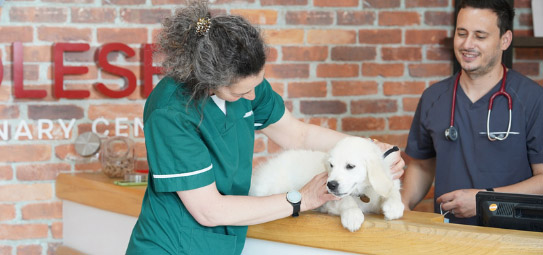
Feathered Friends: Caring for pet birds this spring in Surrey
March 14, 2024
As we bid farewell to winter and welcome the blossoming beauty of spring in Surrey, it’s time to consider the unique needs of our cherished feathered friends. Pet birds, with their vibrant plumage and charming personalities, require special attention as temperatures and daylight hours undergo a seasonal shift.
In this article, our vet and exotics enthusiast Darren Partridge shares essential pet bird care tips tailored to the changing seasons, specifically the transition from winter to spring. For personalised advice and guidance, contact our East Molesey practice for more information – because your feathered friend deserves the best care.
Contact us for bird care advice
Understanding seasonal changes
Vet Darren Partridge has spent many years treating various species of pet bird and says the best thing you can do for your pet is thorough research into their specific needs, and ensure you can achieve them. A great place to start is with how they react to seasonal changes:
- Temperature Regulation: Different bird species have unique temperature requirements. Some birds thrive in warmer temperatures, while others are more comfortable in cooler climates. As seasons transition, Darren recommends that you monitor your bird’s behaviour to ensure they are a comfortable temperature.
- Lighting Considerations: Birds are sensitive to changes in daylight and their behaviour can be influenced by variations in natural light. You should mimic their natural environment by adjusting artificial lighting to provide a consistent photoperiod. This helps maintain their natural circadian rhythms.
Seasonal diet adjustments
- Varying Nutritional Needs: Birds may have altered nutritional requirements based on their activity levels and breeding status during different seasons. Book a consult with Darren or another member of our veterinary team to determine if any adjustments to your bird’s diet are necessary.
- Fresh Produce Availability: Seasonal changes can affect the availability of fresh produce in Surrey. Darren recommends adapting your bird’s diet to include seasonal fruits and vegetables, providing a diverse range of nutrients – always do your research first to ensure any new foods are suitable for your type of bird.
Environmental enrichment
- Outdoor Exposure: If your bird enjoys supervised time in an outdoor enclosure, be mindful of Surrey weather changes. Provide shelter from the elements and ensure they are protected from sudden temperature fluctuations, which can be common in spring.
- Changing Playtime Dynamics: Birds thrive on mental stimulation and physical activity. Rotate their playtime activities each season and introduce new toys, puzzles, or interactive games to keep them engaged.
Health monitoring
- Seasonal Health Risks: According to Darren, certain seasons may bring specific health risks for birds, such as increased exposure to respiratory infections during colder months. As spring can still deliver some cold snaps, book a veterinary check at Molesey Vets so our team can catch and address any potential issues promptly.
- Feather Care: Pay special attention to your bird’s feathers during seasonal changes. Ensure proper grooming and provide opportunities for bathing to maintain feather health.
Adapting cage setup
- Temperature Control in the Cage: Adjust the placement of your bird’s cage to ensure they are not exposed to direct drafts or excessive spring sunlight. Provide a comfortable and cozy corner while avoiding drastic temperature fluctuations.
- Seasonal Cage Accessories: Rotate cage accessories based on the season. Ensure there’s ample shade and ventilation during warmer periods and offer cozy nesting materials during colder months.
Contact us for more bird care tips
Caring for pet birds through seasonal changes requires a delicate balance of attention to their unique needs. If you have specific questions or concerns about your feathered friend, Darren and our veterinary team are here to help.
Contact us for more advice, to schedule a health check, or to discuss personalised care strategies to ensure your pet bird thrives in spring and every season.



